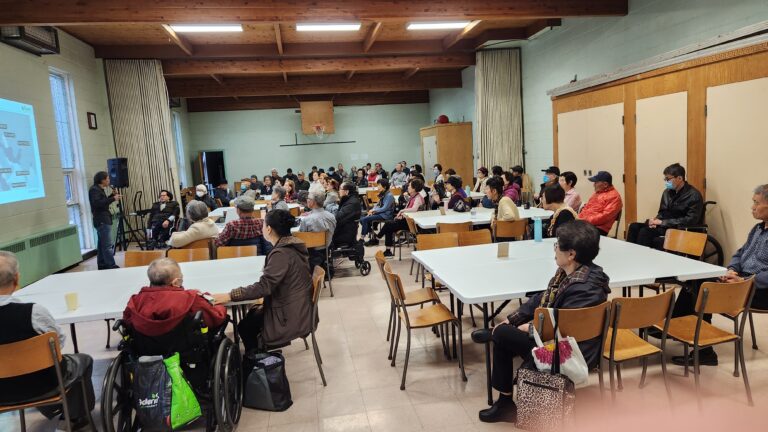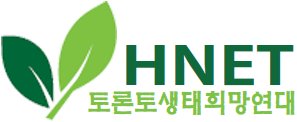
성인장애인공동체에서 한인사회 기후 세미나 ‘희망’ 발견
장애인 공동체 “거대 담론이지만 우리의 문제” 인식 전환
지난 17일은 아주 가끔 생기는 기후위기 나눔의 기회가 주어졌다. 토론토 생태희망연대(HNET)가 한인사회를 대상으로 하는 기후변화 교육 활동 중 하나다. 성인장애인공동체의 배려로 지난 17일 노스욕 한인연합교회에서 열린 강연에는 약 100여 명이 참가했으며 이들과의 한시간은 기후문제에 대한 우리의 인식 수준은 아직 기초적인 단계였지만 큰 희망을 발견했었다.
강의 첫 부분에서 참가자들에게 ‘왜 지금의 기후위기가 일어나고 있느냐’는 질문을 던졌다. 작은 상품을 걸어 많은 분들이 손을 들었지만 ‘오염을 많이 시켜서 그렇다는 정도’가 그나마 근접한 답이었고 여러 차례 반문한 끝에 인류가 배출해 온 이산화탄소 때문이라는 정답을 어렵게 얻을 수 있었다.
다음으로 전세계가 목표로 세운 것이 산업화 이후 지구 평균기온 상승을 몇도 이내로 막으려 하는지 물었다. 좀 더 심화된 질문에는 객관식이 아니라면 맞히기 힘들었을 것이다. 평균 1.5도 이내 상승을 목표로 하고 있다는 것을 말이다.
그럼에도 이들과의 교감을 통해 받은 느낌은 고무적이었다. 1시간의 강의 내내 참가자들은 눈을 반짝이며 몰입했고 우리가 지금까지 살아온 방식이 문제였음을 이해하기 시작했다. 지구 평균 기온이 1.5도가 넘었을 때 벌어질 일이 남의 일이 아니라 바로 나와 자녀들, 손주들의 일임을 인정하는 눈빛이 읽혔다.
세계 상위 10%의 부자가 탄소배출의 절반을 일으켰고 상위 20%가 탄소 배출의 70%를 일으켰다고 했을 때만 해도 나와는 관계 없는 일인 듯 반응했다. 그러나 스위스의 연구기관(Credit Swiss)이 해마다 발표하는 세계 부자 랭킹에서 총 자산(융자금을 제외한 부동산, 자동차 등과 예금 등)이 미화 10만달러 이상일 경우 상위 12%에 들어간다는 자료를 보여주었을 때 갑자기 충격에 빠졌다.
‘우리가 무엇을 하면서 그 많은 이산화탄소를 배출한 것이냐’는 항의성 질문을 하는 이가 있었다. 그럴 만하다. 우리가 편리함을 추구하며 살아온 것들이 사실은 탄소 경제의 기반 위에 이루어 졌음을 우리는 모르고 살아왔기 때문이다. 다시 말해 선진국에서 사는 우리의 생활 모든 것이 탄소를 검은 매연 같은 그림자로 뒤에 달고 있었던 것을 정작 우리는 모르고 살아왔다. 더 크고 넓은 집을 짓기 위해 더 많은 탄소를 배출하며 공장 제품들을 요구했고 건축자재를 요구했으며 이사 갈 때마다 멀쩡한 벽체와 바닥과 부엌 집기를 들어 내고 새롭게 교체했었다. 날마다 타고 다니는 자동차는 편리함의 뒤로 이산화탄소를 배출했다. 집을 완벽할 정도로 냉난방을 했고 블랙 프라이데이 뿐 아니라 늘 유행에 맞는 옷을 사야 했고(옷을 만들고 유통하는 과정 전체가 탄소배출이다) 중남미나 아프리카 아시아에서 재배한 먹거리들을 계절과 관계 없이 비행기로 실어와 먹어야 했다. 끼니마다 알버타주나 미국, 남미에서 사육한 소고기를 식탁에 올렸고 여름이면 바비큐 파티로 매주 탄소 배출의 주범 중 하나인 낙농가의 활동을 격려해 왔다.
강의 마지막 즈음에 ‘그럼 우리가 무엇을 해야 그 문제를 막을 수 있느냐’는 참가자의 질문에 가슴이 답답해 졌다. 마땅히 할 일이 그다지 많지 않아서 였다. 쓰레기 분리 배출도 해결책은 아니고 텀블러나 머그 컵을 들고 다니는 것도 그리 큰 도움이 되지 않는다.
그나마 우리가 할 수 있는 일은 선거 때 세금을 깎아준다는 정책보다는 기후문제를 심각하게 다루는 정책을 내세우는 정당에 투표하기와 무엇인가를 가능한 사지 않기, 집에 태양광 패널 설치하기, 히트펌프로 천연가스 사용 줄이기, 비행기 여행 자제하기, 차량 교체시 전기자동차로 바꾸기 정도다. 그렇다고 개인적인 선택의 변화가 전체를 바꾸지는 못하지만 그 변화마저 없으면 전체는 바뀌지 않는다. 그러니 그 작은 변화라도 시도해야 한다.
막연했던 기후위기에 대해 구체적인 데이터에 기반한 강의로 현실 및 미래에 대한 위험상황을 알 수 있었다. 일상에서 무엇을 할 수 있는지에 대한 구체적인 내용이 담겨 있어 도움이 되었다. 기후위기로 인한 대규모 난민 발생이 남의 일이 아닌 우리의 고민과 선택이 될 것이라는 경고가 와닿았다. 환경이슈가 거대한 담론이긴 하지만 곧 우리의 문제이기도 하다는 인식을 갖게 됐다.’ 등의 피드백을 이후 받게 되니 가능성을 본 것이다. HNET은 한인사회 어느 단체의 요청에도 이 문제를 나눌 것이다.
정필립(토론토 생태희망연대)
In the adult disability community, Korean Canadian community finds ‘hope’ in climate seminar
On the 17th, I had a rare opportunity to share about the climate crisis. This is one of the climate change education activities organized by HNET in Toronto for the Korean community. About 100 people participated in the lecture held at the Korean American Federation Church in North York on the 17th, and the hour-long lecture revealed that our awareness of climate issues is still at a rudimentary stage, but we found great hope.
In the first part of the lecture, I asked the participants, “Why is the climate crisis happening now? With a small prize, many people raised their hands, but the closest they came was “because we pollute a lot,” and after several rounds of questioning, they were able to get the correct answer, which was carbon dioxide emitted by humans.
Next, I asked what the world’s goal is to keep the average global temperature increase since industrialization within a few degrees. This was a more advanced question that would have been difficult to answer without multiple choice. The answer was that the goal is to stay within 1.5 degrees on average.
Still, the feeling I got from interacting with them was encouraging. Throughout the hour-long lecture, their eyes glistened, they were engaged, and they began to understand that the way we have been living is the problem. I could see the recognition in their eyes that what happens when the global average temperature rises above 1.5 degrees Celsius is not someone else’s problem, but theirs, their children’s, and their grandchildren’s.
When I was told that the top 10% of the world’s wealthiest people were responsible for half of carbon emissions and the top 20% for 70%, I reacted as if it didn’t concern me, but when I was shown data from a Swiss research institute (Credit Swiss) that showed that the top 12% of the world’s wealthiest people with total assets (real estate, cars, deposits, etc., excluding mortgages) of more than US$100,000 were in the top 10% of the world’s richest people, I was suddenly shocked.
Some protested, “What have we been doing to emit all that carbon dioxide?” And with good reason. Because we’ve been living our lives without realizing that all of our conveniences are actually built on a carbon economy. In other words, we’ve been living in the developed world without realizing that everything we do has a black, sooty shadow of carbon hanging over it. We demanded factory products and building materials that emitted more carbon in order to build bigger and more spacious homes, and we tore out and replaced intact walls, floors, and kitchen appliances every time we moved. The car you drove every day emitted carbon dioxide in the name of convenience. I had to heat and cool my home to perfection, buy clothes that were always in style, not just on Black Friday (the entire process of making and distributing clothes is carbon-intensive), and eat food grown in Latin America, Africa, and Asia, flown in seasonally. We’ve had beef from Alberta, the U.S., and South America for every meal, and we’ve had weekly barbecues in the summer to encourage dairy farmers, one of the biggest contributors to carbon emissions.
Toward the end of the session, I felt my heart sink when a participant asked, “So what can we do to stop it? There wasn’t much that could be done. Recycling isn’t the answer, and carrying a tumbler or mug won’t help much.
What we can do is vote for political parties that take climate change seriously rather than tax cuts at election time, avoid buying certain things whenever possible, install solar panels on our homes, use less natural gas for heat pumps, avoid flying, and switch to electric vehicles when we replace our cars. These individual choices won’t change the whole, but without them, the whole won’t change. That’s why we need to make small changes.
The lecture on the climate crisis, which was vague, was based on concrete data, and I was able to understand the real and future risks. It was helpful to have concrete information on what we can do in our daily lives. The warning of a large-scale refugee outbreak due to climate change was a wake-up call. I saw the potential in the feedback I received afterward, such as, “I realized that environmental issues are a huge discourse, but they are also our issues. HNET will share this issue with any organization in the Korean community upon request.
By Philip Jung (HNET) (AI translated)
